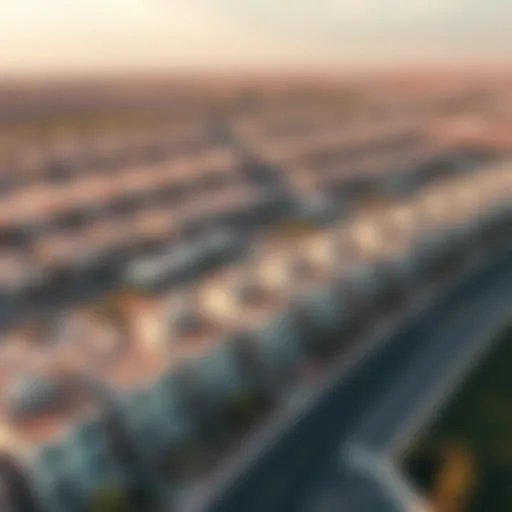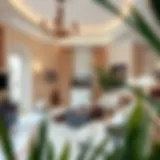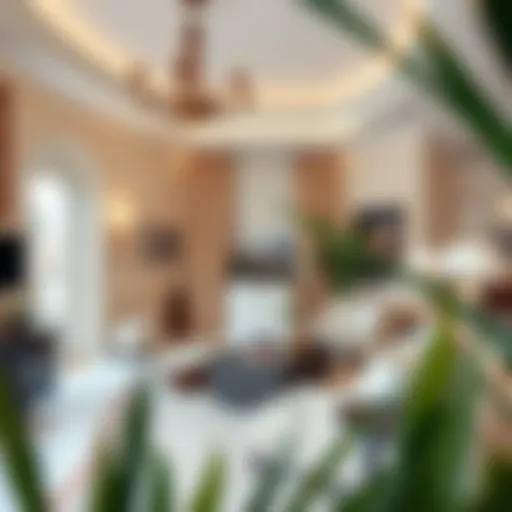Opening Hours of Old Dubai Souks: A Comprehensive Guide
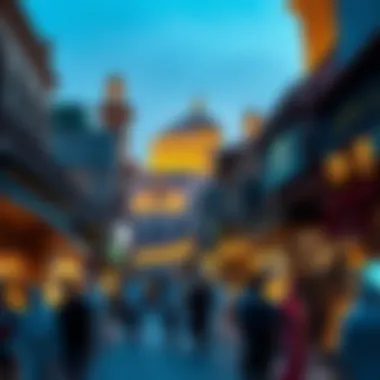

Intro
In the heart of Old Dubai, the souks stand as vibrant reminders of the city’s rich historical tapestry. These bustling markets are not just commercial centers but cultural epicenters where locals and tourists alike converge to experience the nuances of Arabian tradition. Understanding the opening times of these souks offers visitors practical insights that can greatly enhance their experience. Each souk has its own unique rhythm, reflective of the historical and social fabric of the emirate. This article presents a detailed examination of the opening times of Old Dubai’s souks, illuminating their significance beyond mere shopping hours.
As the sun rises and sets over the winding alleyways of these markets, a distinct pattern of activity emerges. The opening and closing times of the souks are often tied to local customs, religious practices, and seasonal variations. For instance, during Ramadan, the schedule may shift significantly to accommodate fasting, which is a crucial aspect of life in the region. With this understanding, visitors can plan their excursions to not only explore the varied offerings but also to engage with the local culture in a meaningful way.
The forthcoming sections will explore the trends and insights related to these markets, how they reflect Dubai's historical context, and what visitors should know to navigate them effectively. In doing so, we’ll delve into the daily rhythms of the souks, the impact of the seasons, and special events, ensuring that the experience is as enriching as possible for all who venture into these lively marketplaces.
Market Trends and Insights
The dynamism of Old Dubai’s souks is not just a reflection of their immediate environment but also indicative of larger market trends. The ever-evolving landscape of consumer habits and global influences can be seen clearly within these markets. Understanding current trends provides a working knowledge of what truly fuels the local economy and culture.
Current Market Analysis
Currently, the souks are thriving hubs, with increased tourism revitalizing bazaars like the Gold Souk and Spice Souk. Seasonal festivities and international events play a significant role in determining foot traffic. Recent reports suggest a marked rise in both local and expatriate engagement with these vibrant spaces. Factors such as the growth of e-commerce and shifting consumer preferences are shaping how these markets operate. Entrepreneurial ventures within the souks have also sprouted, offering unique products that blend traditional craftsmanship with modern appeal.
Historical Trends and Future Predictions
Historically, the souks of Old Dubai functioned primarily as trade routes, where merchants would gather to barter goods. This roots run deep, with customs passed down through generations. Looking forward, the trend appears to be leaning towards integrating technology within these traditional settings. For example, mobile apps that enhance the shopping experience by providing real-time information about store hours and promotions are likely to become commonplace.
Moreover, as the local economy diversifies, there is an anticipation of a shifting demographic in shopper profiles. Younger generations are showing increased interest in sustainability and locally-sourced products, which may prompt shifts in what is sold at these markets.
Embracing this change is paramount for sustaining the souks' relevance in an increasingly digital world. The intersection of tradition and modernity is where the true vibrancy of Old Dubai’s souks will continue to lie.
Understanding Old Dubai Souks
Old Dubai is a tapestry woven with the threads of history, culture, and commerce. The souks, or traditional markets, serve as the beating heart of this vibrant district. They not only showcase the longstanding trading traditions of the region but also highlight the unique cultural nuances that define Dubai. Understanding these souks is essential for anyone looking to grasp the essence of Dubai's rich heritage.
The importance of exploring Old Dubai's souks cannot be overstated. They are not just places for shopping; they are social hubs where stories are exchanged along with goods. Visitors get a glimpse into the daily lives of local merchants, many of whom have been plying their trades for generations.
Historical Context
Dating back to the 19th century, the souks of Old Dubai have witnessed remarkable transformation. Initially, they served as focal points for trade, drawing in merchants from various nearby regions. The Gold Souk, for instance, has seen an influx of traders from India and the Persian Gulf countries, making it a melting pot of cultures. As Dubai flourished, these souks adapted, blending traditional elements with modern influences while maintaining their historical charm.
The architecture itself tells a story. Mud-brick buildings, narrow alleyways, and wind towers have all been preserved, allowing visitors to step back in time. This historical richness serves as a backdrop, enhancing the shopping experience and fostering a deeper appreciation for what these markets represent.
Cultural Significance
The souks are not merely commercial establishments; they are cultural landmarks representing the soul of Dubai. Each souk is a reflection of the community’s values, traditions, and local artistry. The sights and sounds—the aromas of spices mixed with the clinking of gold—act as sensory connectors to a deeper understanding of the cultural fabric that makes up the city.
Visitors often find themselves immersed in a lively atmosphere where haggling and banter are common. This interaction fosters a unique communal bond between buyers and sellers.
Types of Souks
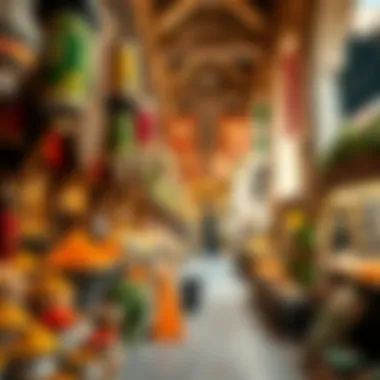

Visitors can explore a range of specialized souks, each dedicated to different goods, highlighting various aspects of local culture and economy.
Gold Souk
The Gold Souk is arguably the most famous souk in Old Dubai. Known for its wide array of dazzling jewelry, this market showcases intricate designs that have become synonymous with Arabic fashion. With gold prices fluctuating, this souk offers competitive rates alongside an impressive selection.
A key characteristic of the Gold Souk is its aesthetic appeal; shopfronts adorned with exquisite pieces that gleam in the sunlight attract tourists and locals alike. Its well-established reputation for authenticity is a huge draw for those looking to purchase high-quality jewelry safely.
Spice Souk
The Spice Souk, a sensory marvel, is a place where scents reign supreme. This market features an eclectic mix of spices, herbs, and dried fruits, vividly displayed in colorful sacks. It is more than just a shopping experience; it provides visitors with a taste of local cuisine, with spices that are integral to traditional Emirati dishes.
A unique aspect of the Spice Souk is the ability to purchase spices in bulk, often at lower prices than in supermarkets. However, navigating through the myriad of choices can be overwhelming for some, making it essential for visitors to engage with local vendors to enhance their understanding of uses and origins.
Textile Souk
The Textile Souk highlights the craftsmanship of artists and weavers who offer a stunning variety of fabrics, from silks to cottons. Shoppers can find everything from fashionable clothing to intricate embroidered pieces. This souk is not solely for garments; it also provides an avenue for cultural exchange as visitors learn about traditional dress and its significance in Emirati society.
One major advantage of the Textile Souk is its vibrant atmosphere. The colors and textures invite exploration, but visitors should be prepared to haggle, as this is part of the shopping culture.
Perfume Souk
Lastly, the Perfume Souk epitomizes the olfactory experience of Old Dubai. Here, you’ll find a myriad of scents, with a strong emphasis on traditional Arabian perfumes. The atmosphere is rich with the aroma of oud and other exotic fragrances.
A fascinating feature of the Perfume Souk is the opportunity to create a personalized scent, a rare chance to engage in the art of perfumery. However, prices can vary widely, and visitors should approach vendors to understand the origins and ingredients of their products.
Understanding these souks is invaluable not only for optimizing one’s shopping experience but also for grasping the cultural richness of Old Dubai. Each souk tells a story that threads through time, culture, and commerce, forming an integral part of the Dubai identity.
Typical Opening Times of Souks
Understanding the typical opening times of the souks in Old Dubai is paramount for anyone planning to visit or engage in commerce. These hours do not merely dictate when one can step into these vibrant markets; they reflect local customs and ensure that visitors have optimal experiences while shopping. Knowing when different souks are open is beneficial for several reasons:
- Planning: Helps visitors schedule their day efficiently.
- Cultural Immersion: Timing can enhance interaction with local traders, as peak hours often see more social activity and engagement.
- Accessibility: Understanding hours facilitates navigating through the bustling markets without inconvenience.
Without a grasp of these timeframes, one might find themselves wandering through closed stalls, missing out on unique goods and experiences that are part of Dubai's rich cultural tapestry.
General Hours for Each Souk
The opening hours for each souk can vary, usually depending on the individual characteristics and products offered in these marketplaces. Here’s a typical outline:
- Gold Souk: Generally opens from 10:00 AM until 10:00 PM, making it accessible for both early birds and night owls.
- Spice Souk: This souk often opens slightly earlier, around 9:00 AM, winding down at 9:00 PM. The aroma of spices on display is hard to resist during these hours.
- Textile Souk: Most shops here open at 10:00 AM and close by 10:00 PM; notable for its rich colors and textiles, albeit quieter in the afternoons.
- Perfume Souk: Like the Textile Souk, it usually welcomes visitors from 10:00 AM to 10:00 PM. Globbing various scents together can be a sensory experience admired throughout the day.
These hours generally reflect a balance of traditional practices while accommodating the rhythm of modern consumer behavior.
Weekend Hours vs Weekday Hours
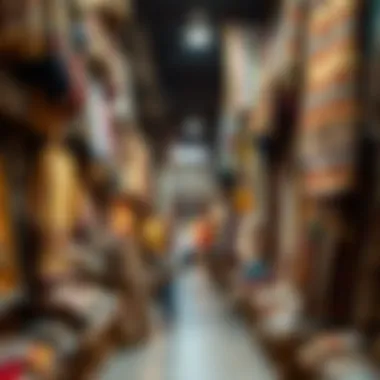

The weekend in Dubai, being Friday and Saturday, often sees souks bustling differently than the rest of the week. During weekdays, which predominantly attract local shoppers, you might find a somewhat subdued atmosphere.
- Weekdays: Souks are usually less crowded from Sunday to Thursday, with hours tending to operate on the aforementioned schedules.
- Weekends: On Friday and Saturday, you can expect extended hours as many shoppers, both locals and tourists, flock to the souks. They may remain open until midnight in some cases, especially during special events or festivals.
It’s important to note that these differences might encourage more bargaining—an integral part of the shopping culture—enhancing the shopping experience in a lively atmosphere.
Impact of Holidays on Opening Times
Holidays can significantly reshape when and how the souks operate. Major Muslim holidays like Eid Al Fitr and Eid Al Adha often lead to extended hours of operation or occasional adjustments in schedule. Visitors might find the souks brimming with festive goods and special promotions during these times.
Similarly, public holidays can lead to sudden influxes of shoppers, which may also alter the hours:
- Eid Celebrations: Many merchants extend their hours substantially to accommodate the surge in foot traffic.
- National Holidays: On days like UAE National Day, souks may also be open longer, offering both shopping and festivities.
"Understanding when to visit can ensure you don't miss out on the local flavors and traditions that shape the souk experience."
Familiarizing oneself with how holidays can influence souk hours can make all the difference in curating an unforgettable shopping experience.
Variability in Hours
In the bustling environment of Old Dubai, the souks are not just places to shop, they are living, breathing entities that reflect the city's rich cultural tapestry. The variability in their operating hours is a key aspect worth understanding, for it holds significance not just for tourists but for the local community as well. It can affect shopping experiences, profit margins for vendors, and the overall atmosphere of these vibrant markets.
Seasonal Variations
The seasons in Dubai influence how and when souks operate. With summer temperatures soaring to highs that can put the most industrious person to sleep, souk owners often adjust their hours to account for heat and foot traffic. Typically, the peak months of June through August see the souks opening later, often around mid-afternoon and extending into the evening. This timing correlates with both the weather and the rhythms of the local population, many of whom prefer venturing out only after the sun sets.
In contrast, during the milder months, say from October to April, you’ll find the souks open earlier, catering to a crowd that is eager to explore before the heat kicks in. Vendors often have a friendly competition going for those early birds, tempting shoppers with enticing displays of wares.
"In the souks, the signs of the seasons manifest not just in yields but in the smiles of the sellers who adapt their hours to the warmth of the sun."
Interestingly, the shifts in seasons bring a different merchandise mix as well. During Ramadan, for instance, many souks may open later to align with iftar—the evening meal that breaks the fast—and stay open longer into the night than they normally would, creating a unique shopping experience that adds to the local culture.
Special Events and Festivals
Events and festivals can also bring about changes in opening times, offering shoppers a chance to experience the souks in a different light. During official holidays, like Eid and National Day, souks often host special events and sales that can draw in crowds both local and abroad. Some vendors might extend their operating hours significantly during these periods to accommodate the influx of visitors.
Additionally, events related to the Dubai Shopping Festival or the Dubai Food Festival often lead to extended operating hours in certain souks, with some vendors staying open well into the night. The thrill of these events doesn’t just provide an opportunity for shopping but also a chance to engage with the community—connecting with sellers and other shoppers in a space that resonates with history and culture.
By being aware of these variabilities in hours—from seasonal adjustments to festival-related changes—visitors can maximize their experiences, ensuring they hit the souks at times that align with the unique vibrancy of Dubai's rich marketplace culture.
Visitor Considerations
When exploring the bustling streets of Old Dubai's souks, understanding Visitor Considerations becomes crucial for a memorable experience. The vibrancy of these marketplaces is not merely in the goods sold but also in the rich cultural fabric they represent. Factors such as timing and etiquette can greatly enhance one’s journey through these historic sites, providing a more fulfilling shopping and cultural experience.
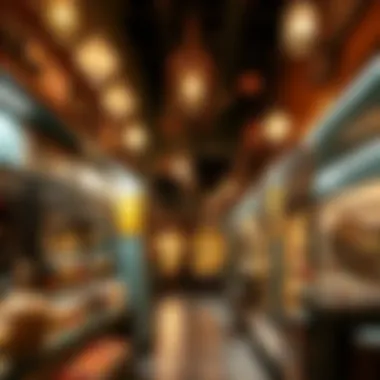

Best Times to Visit Souks
Timing is everything, especially in a place like Dubai where heat can be a formidable presence. The souks tend to open their doors early in the day, often around 10 AM. This is a prime time for visitors, as the temperatures are more bearable, and the foot traffic is lighter, allowing for easier navigation through the winding alleys.
Late afternoon, close to sunset, is also a delightful time to visit. The ambience transforms as the sun dips, casting a warm glow over the stalls and creating a lively market atmosphere as locals and tourists alike flock to shop. During these hours, you might find a bustling energy in the Gold Souk or the aroma of spices wafting more intensely in the Spice Souk.
However, the weekends, particularly Fridays and Saturdays, can see a surge in visitors. Planning your trip during weekdays can give you a more serene experience. It's advisable to keep in mind local holidays and events that might affect crowd sizes.
"Timing your visit right can turn a simple shopping trip into an engaging cultural experience."
Shopping Etiquette
Navigating the cultural nuances of shopping in Old Dubai's souks is as essential as knowing the opening hours. Respect and courtesy in these spaces can go a long way. Here are some key points to observe:
- Bargaining is expected. Don't shy away from haggling over prices. It’s not just a practice; it’s an ingrained part of the culture. Start lower than your target price and work your way up.
- Be respectful. Always greet shopkeepers with a smile and a friendly "Salam Alaykum"; this builds rapport and can lead to better deals.
- Take your time. Souk culture thrives on leisurely browsing and conversation. Rushing can come off as rude.
- Dress modestly. Especially in traditional areas, appropriate attire is appreciated and shows respect for local customs.
- Ask before photographing. Many vendors prefer to keep their products private, so it’s wise to seek permission before snapping shots.
In a nutshell, understanding the art of shopping and respectful interaction makes a world of difference in weaving through the array of sights, sounds, and products these souks offer.
Practical Tips for Navigating the Souks
When wandering through the old souks of Dubai, having practical tips at your fingertips can elevate the experience tremendously. The souks, steeped in rich history and culture, can be labyrinthine. Understanding their layout and planning your visit carefully will not only save you time but also enhance your appreciation of this unique shopping environment.
Transportation Options
Navigating to and around the souks requires some foresight, particularly in a bustling city like Dubai. Here are several options to consider:
- Dubai Metro: The metro is a convenient way to reach key areas. The Al Ras station is particularly close to both the Gold Souk and Spice Souk.
- Buses: An extensive bus network can get you fairly close to the souks. Keep an eye out for schedules; they are usually posted at bus stops for easy reference.
- Taxis and Ride-Sharing Services: Taxis are widely available in Dubai. Ride-sharing apps like Careem and Uber function well, making them a comfortable choice, especially during peak hours.
- Walking: Once you arrive, much of the souk area is pedestrian-friendly. This allows for leisurely exploration of shops and cafes, making it easy to pop into various stalls without the hassle of parking or traffic.
Proper planning ensures not just a stress-free commute but also gives you more time to explore the myriad of goods offered at these traditional markets.
Safety Considerations
While the souks are generally safe, being mindful of your surroundings is essential. Here are some considerations:
- Personal Belongings: Keep your bags close and be mindful of pickpockets, especially in crowded areas. A simple cross-body bag can be quite effective.
- Local Customs: Understanding local customs and behavior is crucial. Dressing modestly is not just a sign of respect but also helps you blend in better.
- Time of Day: While the souks are lively during the day, evening shopping can often be cooler and more enjoyable. However, stick to well-lit areas during late hours.
- Stay Hydrated: Given the warm climate, ensure you have water on hand, especially if you visit during the heat of the day. Keeping hydrated is vital for maintaining your energy levels.
Closure and Recommendation
The exploration of Old Dubai's souks is not just a journey through vibrant markets, but also an engagement with the deep historical threads that weave the very fabric of this city. Understanding the opening times of these souks is crucial for both enthusiasts and those seeking to immerse themselves in the cultural tapestry of Dubai. By recognizing the specific characteristics of each souk's operating hours, visitors can align their plans and maximize their experience.
Summarizing Key Insights
When it comes to the souks, their opening times are often reflective of local customs and traditions. As previously discussed, most souks typically open around 10 AM and close at 10 PM on weekdays, with slight variations during weekends. However, aligning your visit to understand the nuances of these schedules can make the difference between a run-of-the-mill experience and one filled with exploration.
- General Patterns: Most souks observe extended hours during weekends. This is particularly true for the Gold and Spice Souks, which attract more foot traffic on Friday and Saturday.
- Holiday Influence: Islamic holidays can cause shifts in usual hours, as many shops adjust their schedules for celebrations. Being aware of these periods ensures that your visit will not fall flat.
- Visitor-friendly Tips: Strolling through the souks early in the day can often lead to quieter, more pleasant shopping experiences, even in the bustling heart of Old Dubai.
Final Thoughts on Visiting Souks
Visiting the souks is a rite of passage for anyone in Dubai, making your understanding of their opening times a fundamental aspect of your trip. Focus on timing, appreciate the dialogues happening among traders, and soak in the scents of spices and fragrances that enliven the air. The allure of these marketplaces is not just in what you can buy, but in the stories, they tell and the culture they preserve.
Remember, in such a historically rich context, flexibility is key. Be prepared to adapt your plans to the rhythms of the souks themselves. Whether you're hunting for gold, savoring spices, or simply enjoying the buzz of activity, the souks of Old Dubai provide an unforgettable backdrop that enhances every visit. So pack your bags wisely, and step into a world where time seems to intermingle with tradition.



